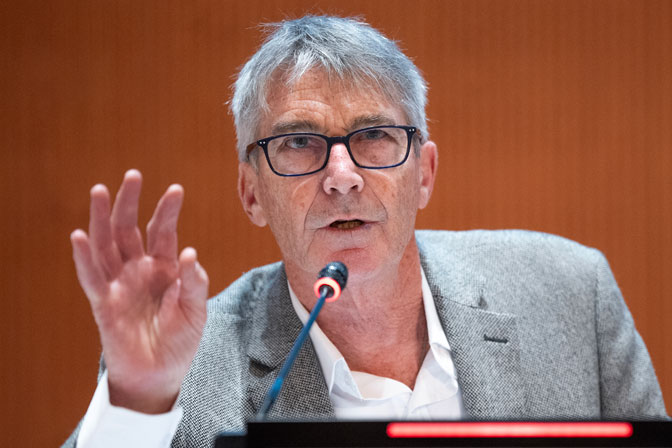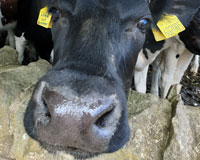
The International Labour Conference, held over two weeks in Geneva in June 2024, had proposals for a new binding convention on biological hazards in the working environment as its major “standard-setting” focus.
The event, the annual meeting of the UN’s tripartite International Labour Organisation (ILO), saw 5,000 delegates participating, from the governments of its 187 member states and from unions and employers’ organisations.
ILO said the rule-making process was aiming to deliver “the first international labour standard to be adopted since the access to a safe and healthy working environment was elevated to a Fundamental Principle and Right at Work.”
James Ritchie (above), who was the workers’ spokesperson in the biological hazards negotiations, said: “We made a strong start. Against objections from the employers we are now preparing both a binding convention and a supporting recommendation.
“And the convention has a broad scope, covering not just occupational infections, but poisonings like Green Tobacco Sickness, non-communicable diseases like occupational asthma and byssinosis (cotton lung) and bagassosis (cane workers’ lung), and injuries.
“We also held out successfully for a broad definition of health, to take account of the impact of biological hazards on the physical and psychosocial health of workers and their well-being.”
Precedent-setting new text in the current draft convention includes language on prevention from dismissal when responding to public health requirements that affect ability to work or while receiving related curative treatments.
“Enforcement is also critical, which is why we insisted on a stipulation that there must be ‘adequate resources and support’ for labour inspection,” said Ritchie.
“The draft also includes a requirement on statutory authorities to ‘take account of environment and climate impacts’ on biological hazards at work, the first ILO convention language to do so, and a requirement for precautionary measures by employers and governments, where there is insufficient information to properly determine risks.”
The supporting recommendation says workers should not lose pay when self-isolating or quarantined because of an infection or infection risk.
Pandemic discord
The negotiations at ILO started as less successful talks on a ‘Pandemic Accord’ reached their conclusion at another UN agency, the World Health Organisation (WHO).
An Intergovernmental Negotiating Body (INB) of WHO member states working on the Pandemic Prevention, Preparedness and Response Accord, which would be only the third binding WHO rule, failed to reach agreement by a 1 June 2024 deadline and agreed to extend the negotiations by a year.
Unions and occupational health and safety organisations had been strongly critical of the draft text, which provided only very limited protections for workers, with these restricted to health and care workers and an unspecified group of ‘essential workers’.
WHO’s Health-World of Work Network (H-WoW) – an informal WHO-convened group which brings together key stakeholders in the world of work, including government agencies for health, labour and social protection, occupational health and medicine organisations, business leaders, employers and trade unions – had supporting amendments drafted by the ILO to provide protections for all workers, but these were not taken up by the INB.
A 27 March 2024 statement from the H-WoW network had called for protections for all workers, regardless of sector, including health and socioeconomic measures.
The network warned that the Covid-19 pandemic has highlighted the critical nature of the world of work in pandemic planning and response, in the healthcare sector but also far beyond, and highlighted the far-reaching impact pandemics can have on the world of work.
WHO convenes the H-WoW network with the goal of increasing access to accurate and relevant information and building a collaborative approach to health emergency preparedness and response.
BIOHAZARDS RULE
When the Covid-19 pandemic hit, there was not a single global rule in place to protect the workers whose health and jobs were early casualties. But, reports Hazards editor Rory O’Neill, that’s set to change, as negotiations to introduce a groundbreaking international regulation on biological hazards have now reached the half-way point.
| Related stories | |
| • | CAUGHT IT? First the cows got bird flu, then dairy workers |

| Hazards webpages | |
| • | Infections |
| • | Climate |
